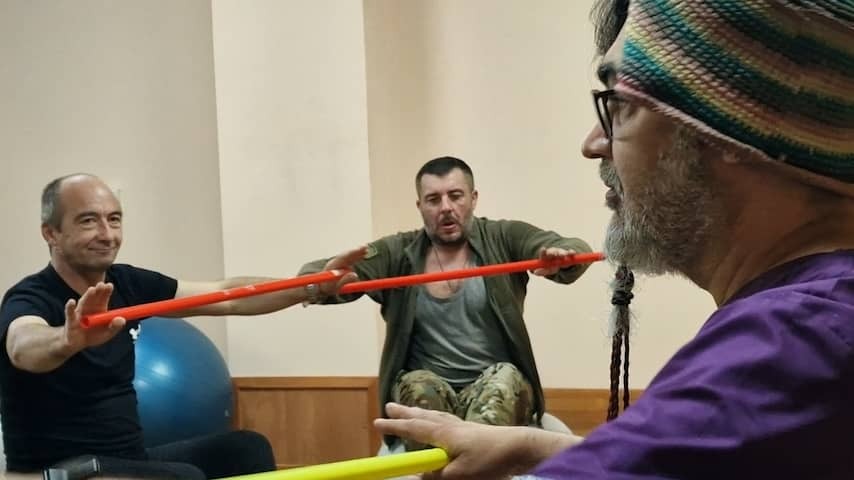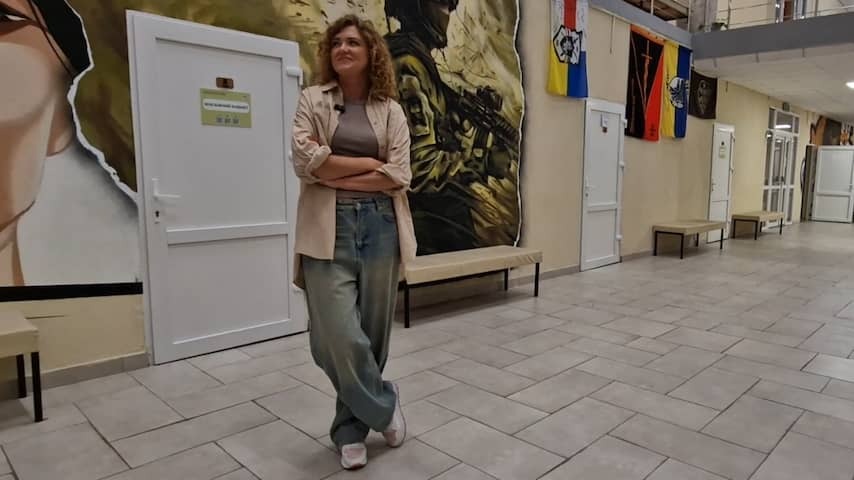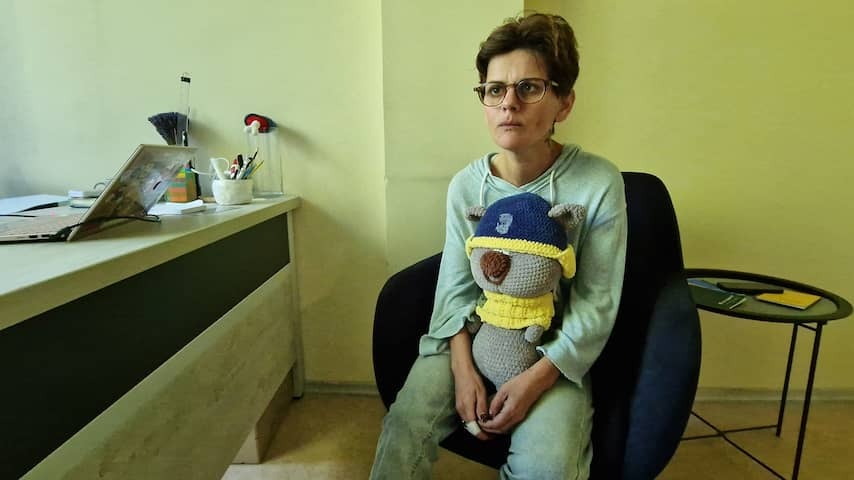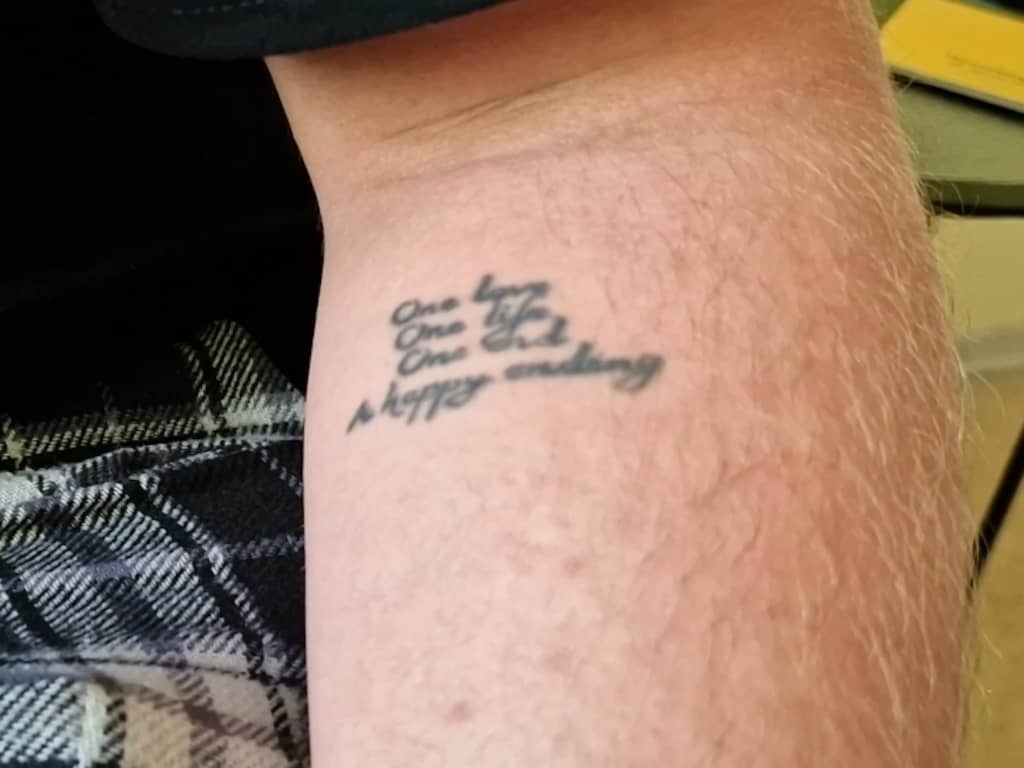
Whoever travels through Ukraine sees them everywhere: the wounded soldiers. They miss a leg, an eye or arm. At the same time, there are also thousands with problems that you do not see on the outside. War journalist Hans Jaap Melissen visits a clinic where soldiers with mental problems can recover.
The Lisova Polyana clinic for ‘invisible injuries’ is reflected in a forest on the edge of Kyiv. There is no war violence this morning. The Air Alarm app shows a map of Ukraine with barely red areas: only on the Eastern Front flute back and forth. But here only the birds whistle. The clinic is full of soldiers, men and women, with whom the map of the war does turn continuously red, then in their heads. And so they hope to recover mentally here, after more than three years (and sometimes longer) war.
“I get a panic attack when I hear something about electricity,” says Grigory, who was stuck with the Russians for six months as a prisoner of war. They have put electricity on its genitals ‘until the battery was empty’. He also misses part of a finger: cut off. “It was hell, we have been treated barbaric, sixteenth-century.”
At Grigory (22) the stress of his face can be read. It is not that long free. “It was normal that you continuously thought you could die. Even if you were asleep. Someone could always come in who wanted to torture you or kill you.”
Now he undergoes all kinds of therapy. Not only conversations with a psychotherapist, but this center offers much more. “Massage, gardening, archery lesson, sword fighting as part of aggression therapy or mindfulness. And yoga, which is the most popular,” says Ksenia Voznitsyna, the director of this clinic. “We are talking about invisible injuries. Many just seem cheerful, but there are black stories inside. Yet we think that most people can heal, especially through combination therapy,” says Voznitsyna.
With a ‘patriotic cat’ along the psychotherapist
Thousands of soldiers have already been treated here. They stay there for a few weeks to several months. There is always room for 220 men, but also women, such as Alla Shuriakova (45). She has been involved in the war for a long time, from 2015 at the front, a little more back later. “I have endured a lot of fear, unhealthy quantities,” she says. Today she will visit her psychotherapist for the last time.
Upon entering, she immediately takes a big doll and keeps it close to her. “This is the patriotic cat,” she says. The hug must offer a kind of protection. “I came here because ordinary society is chasing me a lot of fear. I am vulnerable in the outside world. I am safe here and I feel a kind of brotherhood with people who are the same. And I learned to play pool here,” she laughs carefully.
In the hall there is a group of polar billiards. One of them bumps a ball so hard that it jumps off the table and bounces through the quiet hall. It is almost symbolic: everyone here has also fallen a bit off the table. But Alla Shuriakova hopes that she has now been recovered enough. Although she will miss the clinic. “My treatment is ready, unfortunately.”
She does not go back to the front, but does want to work in the supply. “There is a general disrespect for people who do that work, but it is essential work to bring good things to the first line.”
Concussions are a big problem
The clinic also offers a place to people with whom there are partly physical complaints, the director still explains. “People with concussions they have sustained with heavy artillery impacts. That is a big problem, because the Russians are shooting a lot of artillery.”
Igor (50) is such a patient. “A year ago I was both physically and mentally injured. First they sent me to an ordinary hospital. Until others pointed me to this place. Really great here.” He thinks the combination of therapies works well. “And communication with other soldiers, my brothers in arms .”
Igor is a citizen who became an infantryman a few years ago. When he got into trouble and left the army, he tried to pick up his old work at a seed production company. “That was not a success, I didn’t succeed anymore. I am mentally just too connected to the war, certainly as long as it continues.”
But returning to the army also proved difficult. The bureaucracy had already written off him and he received an army pension. “That stamp is difficult to change and so I will help as a volunteer.”
Former prisoner may decide for themselves whether they will go back to the front. Grigory has decided that he is holding the war. “It’s time for a new chapter in my life, studying, a family.” He points to his tattoo on his forearm who expresses how he sees the way to the future: ” One love, one life, one end, a happy ending. “
Anyone Traveling Through Ukraine Sees Them Everywhere: The Wounded Soldiers. They are missing a leg, an eye, or an arm. At the same time, there are also thousands with problems that you cannot see on the outside. War Correspondent Hans Jaap Melissen Visits a Clinic Where Soldiers with Mental Problems Can Recover.
The Lisova Polyana Clinic for ‘Invisible Wounds’ is Quiet, in A Forest on the Edge of Kyiv. There is no war violence this morning. The Air Raid Alarm app shows a Map of Ukraine with Hardly Any Red Areas: Only on the Eastern Front Is Everything Whistling Back and Forth. But here only the birds whistle. The Clinic is full of soldiers, Men and Women, for whom the map of the war is continuously red, in their heads. And so they hope to recover mentally here, after more than three years (and Sometimes Longer) of War.
“I get a Panic Attack when I hear something about electricity,” Says Grigory, Who was a hero as a prisoner of war by the Russians for Six Months. They put Electricity on His Genitals ‘Until the Battery was Empty’. Hey is also missing part of a finger: cut off. “It was hell, we were treated Barbarically, Sixteenth-Century.”
The Stress Can Be Read on Grigory’s (22) Face. He has been free for very long. “It was normal there that you constantly thought you could. When you were were sleeping. Someone could always come in who wanted to torture or kill you.”
Now he undergoes All Kinds of Therapy. Not only conversations with a psychotherapist, but this center sacrifices much more. “Massage, Gardening, Archery Lessons, Sword Fighting As Part of Aggression Therapy, or Mindfulness. And Yoga, which is the most popular,” Says Ksenia Voznitsyna, The Director of This Clinic. “We talk about invisible wounds. Many seem just happy, but there are black stories inside. Yet we think that most can be cured, as special through combined therapy,” Says voznitsynyna.

Going to the psychotherapist with a ‘patriotic cat’
Thousands or Soldiers have already leg treated here. They Stay for a Few Week to Several Months. There is Always Room for 220 Men, but also Women, Such as Alla Shuriakova (45). She Has Been Involved in the war for a very long time, from 2015 at the front, later a Little Further Back. “I have endured a lot of fear, unhealthy amounts,” She says. She is visiting the psychotherapist for the last time today.
Upon Enterting, She Imediately Grabs A Large Doll and Holds It Close to Her. “This is the Patriotic Cat,” She says. The Cuddle Should Supe Some Kind of Protection. “I came here because it is ordinary society scares me a lot. In The Outside World, I am vulnerable. Here I am Safe and Feel A Kind of Brother Hood with People who are the Same. And I Learned to Play Pool Here,” She Laughes Laugh.
Playing Pool is in The Hall, A Group. One of them hits a ball so hard that it jumps off the table and bounces through the silent hall. It is Almost Symbolic: Everyone here has also fallen off the table a bit. But Alla Shuriakova Hopes That She Has Now Recovered Sufficiently. AltheHeH She Will Miss the Clinic. “My Treatment is finished, unfortunate.”
She is not going back to the front, but mens to work in supplies. “There is general disrespect for people who do that work, but it is essential work, to bring good supplies to the front line.”

Concussions are a big problem
The clinic also sacrifices a place to people who have partialy physical complaints, the director explains. “People with Concussions They Sustined from Heavy Artillery Impacts. That is a big problem, because the Russians are firing a lot of artillery.”
Igor (50) is such a patient. “I was injured Both physically and mentally a year ago. First they sent me to a regular Hospital. Until Others Pointed me to this place. Really great here.” The finds the combination of therapies particularly effective. “And the Communication with Other Soldiers, My Brothers in Arms .”
Igor is a civilian who Became an infantryman a few years ago. When he got Into Trouble and Left the Army, he tried to resume his old job at a Seed Production Company. “That was not a success, I could not do it anymore. I am just too mentally connected to the war, eSpecially as long as it continues.”
But Returning to the Army also Proved Difficult. The Bureacracy had Already Written Him Off and He Received an Army Pension. “That Label is Difficult to Change and So I’m Going to Help As A Volunteer.”
Former prisoners of war can decide for themelves Whether they will return to the front. Grigory has decided that he is done with the war. “It’s time for a new chapter in My Life, Studying, A Family.” He points to his tattoo on his forearm which expresses how he sees the way to the future: ” One love, one life, one end, a happy ending. “
